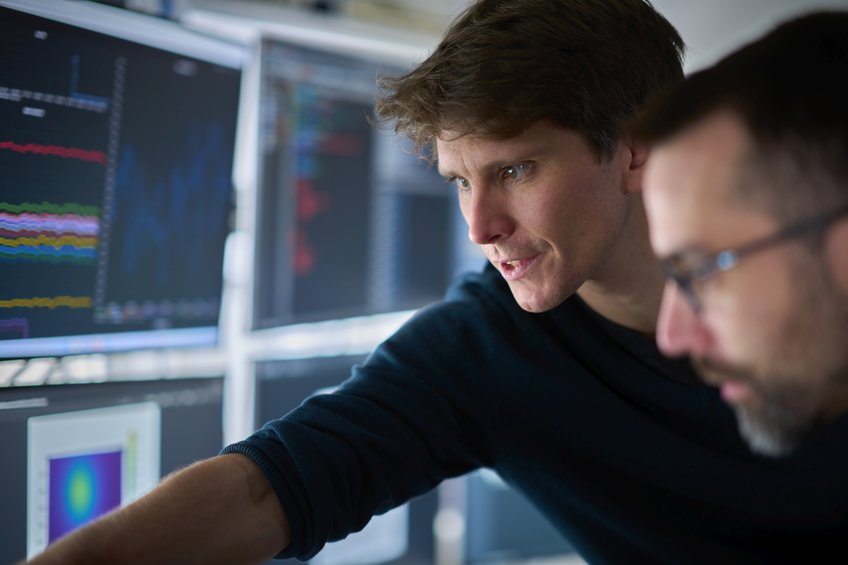
Controlling the unimaginable
Munich, Cambridge, Berkeley, Garching: Johannes Zeiher likes to set off to new shores - also academically. His goal: to control individual atoms in such a way that they can calculate or simulate complex problems in quantum computers.
Quantum physicist Johannes Zeiher returned from Berkeley University in California back to Garching in 2020. Since then, he is leading his own research group at the Max Planck Institute of Quantum Optics. With his team, he investigates, among other things, how to control individual atoms using high-precision laser beams. This knowledge is necessary to develop novel, practical quantum computers. To turn this revolutionary concept into reality, Johannes Zeiher and colleagues have founded planqc – a start-up that has already been awarded a prize.
Johannes Zeiher loves to investigate things that most people don't even have the slightest clue about: Quantum systems. In 2008, Johannes Zeiher came to the Max Planck Institute of Quantum Optics, or MPQ for short, as a student assistant during his Bachelor's degree in physics. At first, his focus was laser chemistry: At the time, we studied the properties of molecules in different liquids," says the quantum physicist: "Things were pretty chaotic in there." Johannes Zeiher, however, wants to truly understand how atoms behave as components of the smallest systems, namely quantum systems: "I am fascinated by discovering how we can gain control over individual atoms, how we can build quantum systems atom by atom and understand their nature from the bottom up" This is not a quirk, but has a lot of practical relevance for the development of new technologies such as quantum computers.

Since 2022, Johannes Zeiher is head of the MPQ research group "Quantum Matter Interfaces", and is able to fully devote himself to this field of research. Previously, he had studied and researched – in addition to the MPQ – at various elite research institutions: Ludwig-Maximilians-Universität, Cambridge University and Berkeley University. A key factor in his academic career was his move to Immanuel Bloch's "Quantum Many-Body Systems" department in 2010 - to which Zeiher's research group also belongs today. Immanuel Bloch is one of his most important mentors: "I entered the world of quantum physics with Immanuel, and he supported me strongly from the very beginning," says Johannes Zeiher: "And he continues to do so today, both in the fundamental research and in transferring it to practical applications."
Zeiher's topics: Superfluids and Bose-Einstein condensates
But first things first. Let's start with a quick dive into Johannes Zeiher's fundamental research before we look at the application aspects. The focus of his interest are, for example, superfluids or so-called Bose-Einstein condensates – macroscopic matter waves that almost completely elude our intuition. Nevertheless, Johannes Zeiher knows how to explain them in an understandable way even to the lay person. The trick is very low temperatures, like really, really low.
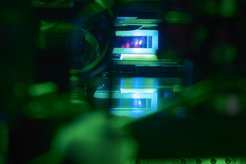
The universe has a temperature due to microwave background radiation of 2.7 Kelvin or just below -270.5 degrees Celsius. For Johannes Zeiher's experiments, this still is hot as hell. He needs it much colder. Closer to zero kelvin, the absolute temperature zero. At zero kelvin, atoms stop moving. Scientists like Zeiher can then observe them individually, put them together in groups – and assemble them into quantum systems.
The physicists don't need an ultra-freezing machine to get close to absolute zero. Instead, they use high-precision laser beams to cool atoms. In this process, the laser light acts in the opposite direction to the direction of movement of the atoms – and slows them down almost to a standstill. A nearly motionless atom can be held close to absolute temperature zero – even if room temperature prevails in the neighbourhood. Then lasers are used again to catch the nearly motionless particles in light traps. With these light traps, Johannes Zeiher's team can examine individual atoms as well as entire groups of atoms. For them, groups of atoms consist of millions of atoms – which can be transformed for example into the above-mentioned Bose-Einstein condensates. "In these light traps, we can investigate fundamental properties and patterns in the interplay between many atoms," explains Johannes Zeiher, "which also underlie practically relevant applications such as superconductivity."
Keeping control of quantum bits
From individual atoms, physicists like Johannes Zeiher can even build quantum computers. Whereas in a conventional computer, for example magnetic states of matter are used to store information, in quantum computers – the name tells it already – it is quantum states. The difference: the basic storage unit in today's computers, the bit, knows two states: zero or one. In quantum bits or qubits, zero or one are also possible – plus any superposition states in between.
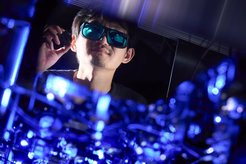
Moreover, the qubits influence each other, which leads to an enormous number of possible quantum states even for small numbers of qubits. The performance of such machines can therefore increase almost unimaginably compared to the classical computers in use today.
However, there is a catch: controlling the quantum bits is much more difficult than keeping a grip on the bits that are based on magnetism. Which brings us back to Johannes Zeiher's research and his delight in complex systems: He strives to gain control over quantum states – just like many other researchers around the world in this extremely rapidly advancing field.
German Start-up Award for planqc
Nevertheless, Johannes Zeiher is not just one among many. The proof: together with three research colleagues, Sebastian Blatt, Alexander Glätzle and Lukas Reichsöllner, Johannes Zeiher founded the company planqc. The spin-off from the MPQ is working specifically on the development of new types of quantum computers. The project seems promising and CEO Alex Glätzle has already convinced investors of the idea: they have financed planqc with 4.6 million euros, a sum that no one would spend on nonsense. Recently, planqc also won a 29 million euro contract from the German Aerospace Centre (DLR) to build the first digital quantum computer in Europe based on neutral atoms, i.e. non-ionised atoms. For this success, Alexander Glätzle – and actually the whole team – has just been awarded the German Startup Award as Newcomer of the Year.
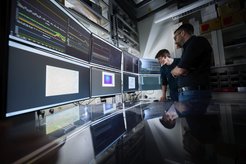
The vision of planqc is to build quantum computers based on neutral atoms controlled by very precise lasers. The inaccuracies that currently still occur when using qubits should be significantly reduced by the planned developments. Once the idea is ready for practical application, it could become a game changer in industrial engineering, for example.
For Johannes Zeiher, founding planqc is a logical next step in his research activities. The environment also plays a crucial role, as he says: "Here in the Munich Quantum Valley, we find ideal conditions for research and for founding a company." This allowed planqc to evolve quickly. Zeiher, Glätzle, Blatt and Reichsöllner founded planqc in April 2022 – exactly when Johannes Zeiher became a father: "Of course I was there for the birth of my son," he says: "But when I wanted to go to the notary a few days later for the incorporation of planqc, I had to beg my wife a little bit."
Exploring what is truly fascinating
Meanwhile, planqc has over 15 employees and is planning to move to larger premises. The future location will be a former hardware store in Garching. There will also be enough space for other young companies, as Johannes Zeiher says: "For us it is important to work in an environment where mutual exchange is possible. That is the prerequisite for flourishing new ideas."
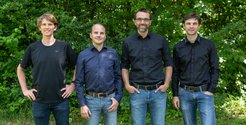
Johannes Zeiher has benefited from the exchange of ideas throughout his academic career, and as a result he has always set out for new shores: "It's extremely important not to continue on beaten paths." His advice to young scientists who want to make a difference like Johannes Zeiher: "Devote yourself to research topics that really fascinate you. A life in science is like running a marathon. There are ups and downs, and you only keep going if you are really, really convinced of something." Like Johannes Zeiher, who is driven by a desire to control the – almost – unimaginable.












